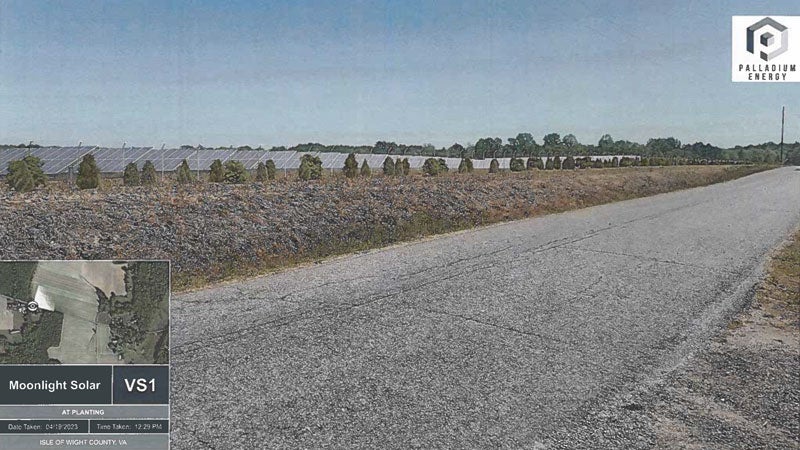Moonlight solar farm headed back to Planning Commission
Published 4:21 pm Friday, March 22, 2024

- This rendering created by Timmons Group for Palladium Energy shows the Moonlight solar farm from Burwells Bay Road as it would look when a landscape buffer is first planted. (Image courtesy of Timmons Group via Isle of Wight County)
An application for a new 44-megawatt solar farm at Burwells Bay and Moonlight roads is headed back to Isle of Wight County’s Planning Commission for another vote.
Representatives of Palladium Energy, Moonlight Solar LLC’s Jacksonville, Florida-based developer, had asked the Planning Commission in November to defer voting until January after a report by county staff identified multiple weaknesses, but the commissioners didn’t heed the request and voted unanimously on Nov. 28 to recommend denial of Palladium’s requested conditional use permit.
The Board of Supervisors, which has the final say in the matter, voted unanimously on March 21 to defer final approval of Palladium’s application until after the Planning Commission has an opportunity to review changes Palladium has made to its proposal since November.
The original application had listed a 523-acre project site. Palladium’s latest proposal shows that 231 acres, or 44%, of the land would be fenced and host solar panels, down from the 250-acre fenced area originally proposed.
Among the weaknesses county staff had identified in November was a 36-acre impact to “ecological cores,” or wildlife habitats, of “high importance.” Palladium’s revised proposal reduces the projected impact to 8.9 acres and eliminates an additional 4.4 acres of “moderate importance” ecological cores.
Chance Zajicek, development manager for Palladium, told supervisors the company planned to use larger solar panels spread over a smaller footprint to achieve the reduction in fenced acreage and ecological core impacts while maintaining the project’s nameplate generating capacity.
The project is now proposed to take 242 acres of prime farmland out of agricultural use, down from the original 274. Isle of Wight, which has approved nine solar farms since 2015, amended its zoning ordinance to include a 2,446-acre, or 2%, cap on the cumulative amount of prime farmland devoted to solar. Just over 2,200 acres are already spoken for, though the supervisors have the option of approving each individual solar farm on its merits despite the limit.
Visibility from historic homes, including the 19th century Carroll Plantation house adjacent to the project site, was another weakness identified in the county’s November report that Palladium has proposed to remedy. The company is proposing to increase the project site’s distance from the Carroll house from 250 feet to 342 feet and plant a landscape buffer at the beginning of construction rather than its end to give the tree line an additional year to grow.
What hasn’t changed, at least on paper, is Moonlight’s half-mile distance from the 2021-approved Cavalier solar farm that will span 1,750 acres across the Isle of Wight-Surry county line.
Caleb Kitchen, the county’s project manager for the Moonlight project, clarified to the supervisors that though the Cavalier and Moonlight parcels technically touch, the fenced areas of each project are 1.4 miles away from each other.
Of the five speakers at the supervisors’ March 21 public hearing on Moonlight, three urged support for the project while two opposed it.
Tom Endrusick of Smithfield, one of the three supporters, urged each locality to do its part in combating climate change by approving carbon-free energy sources like solar.
“I have farmed my whole life; I’m 55 years old and I can’t farm forever,” said George “Ben” Edwards of Moonlight Road and owner of the land on which the solar panels would be placed.
Steve Murphy, however, who’d previously spoken in opposition to Moonlight at the Planning Commission’s November hearing, complained that his mailbox had already been hit multiple times by construction vehicles traveling to and from the Cavalier site down the narrow road.
“There’s a lot of residents out there that move out there to get away from the city and light industrial, and now this will be in our backyard,” Murphy said.
“For me, if we voted on it tonight, I would be in favor of it,” said Supervisor William McCarty. “However, I think it needs to go through the proper process so that the Planning Commission can see the feedback that’s been disseminated through the public process.”
Board of Supervisors Chairman Joel Acree seemed supportive of the project as well.
“Growing up in this county, a lot of farmers … may not have had a whole lot of money in the bank, but they had their land, and that land was for their families to live off of, and it’s been that way for generations,” Acree said. “And as things change, and farming has changed, some of the children go on to do other things and they don’t farm, and I do struggle with telling a farmer or farming family that they can’t do certain things with their land that might preserve … the land in the family for future generations.”





